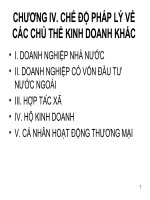slide bài giảng e 12 UNIT 4 READING
Bạn đang xem bản rút gọn của tài liệu. Xem và tải ngay bản đầy đủ của tài liệu tại đây (2.24 MB, 25 trang )
Welcome to our class
Kim’s Game
- Work in 2 groups.
- Look at the following pictures and try to remember
them.
- 2 representatives of 2 groups go to the board and
write the words.
Newspaper
Book
News program
Email
Website
Drama
Leaflet
Reality show
Documentary
1. Do you often use these forms of the mass media?
2. How many groups of the mass media are there?
Unit 4: THE MASS MEDIA
Lesson 3: Reading
MASS MEDIA FORMS
Vocabulary
MASS MEDIA FORMS
1. News programmes
2. Data sharing
3. Leaflets
4. Reality shows
5. Instant messaging
Chương trình tin tức / thời sự
Chia sẻ dữ liệu
Tờ rơi
Chương trình thực tế
Tin nhắn tức thời/ nhanh
Task 1. Work in pairs. Put the words/phrases related to
the mass media in three groups.
- News programmes
-
Reality shows
Instant messaging
Leaflets
Data sharing
Websites
Dramas
Newspapers
Books
Social networking
- Magazines
d
e
m
s
s
a
m
e
h
T
ia
Television
The Internet
Books
Magazines
Leaflets
Newspapers
News programmes
dia
The mass me
Television
Dramas
Reality shows
Documentaries
The Internet
Websites
Social networking
Instant messaging
Data sharing
Task 2. Quickly read the text and choose the best heading.
a. The history of print media
b. Forms of mass media
c. The advent of the Digital Media Age
d. Means of mobile communication
Task 3. Match each of the words with its meaning
a. audience (n)
/ˈɔːdiəns/
1. appear; begin to be known or noticed
b. broadcast (v)
/ˈbrɔːdkæst/
2. the ordinary people in society who are not
leaders or who are considered to be not very
well educated
c. advert (n)
/ˈædvɜːrt/
3. the people who watch or listen to a particular
programme (a play, concert, talk, ect.)
d. the masses (n)
/mæsiz /
4. send out programmes on TV or radio
e. emerge (v)
/iˈmɜːrdʒ/
5. the time when something first begins to be
widely used
f. advent (n)
/ˈædvent/
6. a notice, picture or film telling people about a
product, job or service
1
2
3
4
5
6
7
8
Task 3. Match each of the words with its meaning
WORDS
a. audience (n)
khán giả
b. broadcast (v)
phát thanh, truyền hình
c. advert (n)
tờ / mục quảng cáo
MEANING
3. the people who watch or listen to a particular
programme (a play, concert, talk, ect.)
4. send out programmes on TV or radio
6. a notice, picture or film telling people about
a product, job or service
d. the masses (n)
2. the ordinary people in society who are not
quần chúng nhân dân
leaders or who are considered to be not very
well educated
e. emerge (v)
nhô lên / nổi lên
f. advent (n)
sự xuất hiện
1. appear; begin to be known or noticed
5. the time when something first begins to be
widely used
Task 4. Read the text again. Decide if the following statements are
true (T), false (F), or not given (NG). Tick the correct box.
T
1. Mobile phones and the Internet are the only forms
of mass media.
2. The role of mas media is to entertain, amuse, inform,
educate and unite people.
3. The mobile phone is regarded as a unique means of
communication.
4. People nowadays prefer instant messaging and social
networking to email.
5. Only digital media have influenced people’s lives and
society.
F
NG
Task 5. Work in pairs. Talk about the forms of mass media
that you use every day. Explain how you benefit from
using them.
Forms of mass
media
The internet
Radio
Cinema
Recordings
Television
Task 5. Work in pairs. Talk about the forms of mass media
that you use every day. Explain how you benefit from
using them.
1. Which form of the mass media do you
prefer?
2. When do you use it?
3. What do you use it for?
4. How often do you use it?
5. What benefits do you get from it?
Homew
- Learn
all the new vocabulary
ork
- Prepare the new lesson.
Thank
you
a. audience (n)
/ˈɔːdiəns/
3. The people who watch or listen
to a particular programme (a play,
concert, talk, ect.)
b. broadcast (v)
/ˈbrɔːdkæst/
4. send out programmes on TV or radio.
c. advert (n)
/ˈædvɜːrt/
6. a notice, picture or film telling
people about a product, job or service
d. the masses (n)
/mæsiz /
2. the ordinary people in society who
are not leaders or who are considered to
be not very well educated
e. emerge (v)
/iˈmɜːrdʒ/
1. appear; begin to be known or noticed
f. advent (n)
/ˈædvent/
5. The time when something first
begins to be widely used









